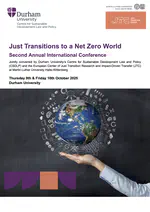DART: Digital Arctic Twins
 Photo: Colourbox
Photo: Colourbox
DART (Digital ARctic Twins) is a network funded by UArctic 2024-2026.
Partners: University of Oslo (NO), The Arctic University of Norway (NO), University of Aberdeen (UK), Durham University (UK), Glasgow Caledonian University (UK), IT University of Copenhagen (DK), Luleå Technological University (SE), University of Washington (USA) and Aarhus University (DK).
Coordinator: Einar Broch Johnsen, University of Oslo (contact)
Synopsis: DART is a network spanning five circumpolar countries (NOR, SWE, DNK, GBR, USA). We will develop digital twins to study just transitions to net zero under the aegis of the UArctic ‘Climate Justice’ thematic network.
The principles for global co-operation towards net zero are described in Article 6 of the Paris Agreement, which offers a primary directive to encourage markets to move towards net zero through bilateral and/or multilateral treaties between participating States. The creation of these bilateral treaties is, however, fraught with problems. A major bottleneck lies in understanding the interconnected feedback loops through which their context-sensitive market-based instruments will affect, and be affected by, changing environmental and economic systems.
A promising approach to describe and understand those feedback loops – and to quantify the uncertainty involved in bilateral treaty implementation - lies in the creation of digital twins: digital representations of places and processes that can be used to simulate the likelihood of given outcomes from bilateral agreements. Importantly, digital twins can be co-ordinated with a range of AI-enabled technologies (including Bayesian inference) to quantify uncertainties in less tangible parameters, such as cultural and legal values, allowing consideration of the policy and legal frameworks that must accompany market-based instruments to set the right incentives and provide oversight. Given the speed with which the Arctic climate is changing, the insights provided by simulation of the various places and peoples of the Arctic must be seen as a priority in any move towards just transitions in northern countries. The creation of digital twin methodologies to support such simulations is a key enabler.
The DART network project will do just that: our interdisciplinary team (biodiversity, health, environment, culture, economy) will inform the creation of digital twin infrastructures for modelling responses to complex climate legislation and – critically - quantify the uncertainties associated with Paris Agreement tools (see, e.g., the paper Understanding the origin of Paris Agreement emission uncertainties) to support cost-efficient Arctic transitions to net zero. The project builds on world-leading interdisciplinary research into digital twin creation at UiO and Aarhus (e.g. to model vaccination strategies, to model the Oslo Fjord). It will be informed by circumpolar and transnational expertise in legal (Durham, Glasgow Caledonian, UiT), economic (Durham, Luleå), environmental (Luleå, Glasgow Caledonian), and health (Aberdeen, Washington) infrastructures across countries and places.
Workshop 1: Oslo, 11-13 February 2025
More information here.
Hackathon : Nesoddtangen, 10-12 June 2025
More information here
Principal Investigators
University of Oslo (NO)
- Einar Broch Johnsen
- Nils Christian Stenseth
- Atle Jensen
- Silvia Lizeth Tapia Tarifa
- Andrea Pferscher
- Rudi Schlatte
The Arctic University of Norway (NO)
University of Aberdeen (UK)
Durham University (UK)
Glasgow Caledonian University (UK)
IT University of Copenhagen (DK)
Luleå Technological University (SE)
University of Washington (USA)
Aarhus University (DK)
DART is also connected to the strategic initiative JusTNOW: Just Transitions to a Net Zero World at Durham University (More info here).



